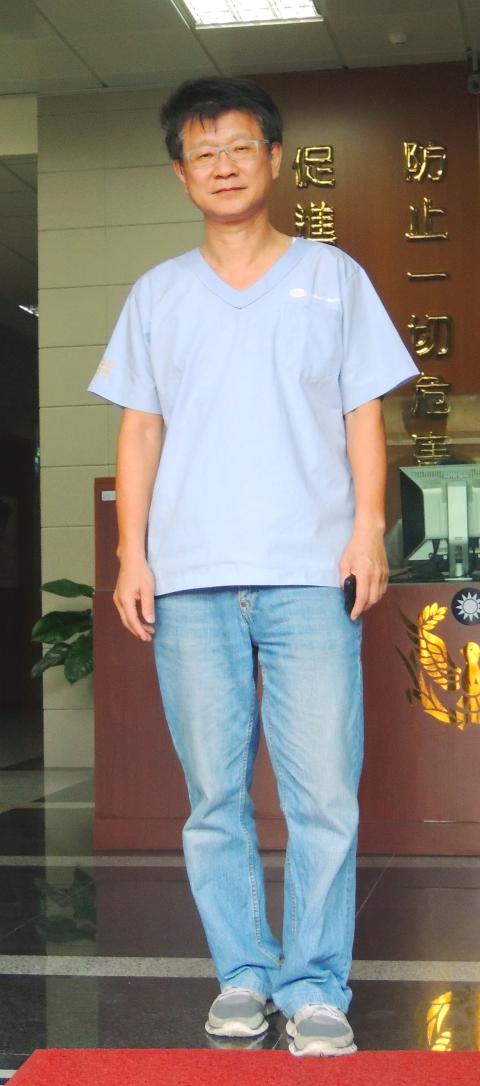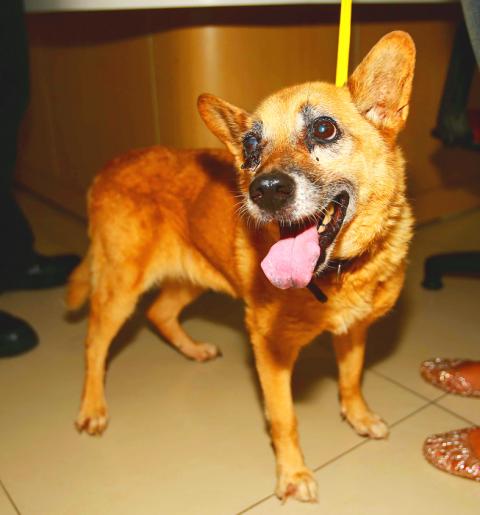The Australian Office Taipei, the de facto embassy of Australia, is facing a hairy public relations problem named Benji.
Benji is a 10-year-old mongrel that had a debilitating stroke earlier this year and was taken to a local veterinarian, Yang Dong-sheng (楊東盛). According to the dog’s owner, Representative Kevin Magee of the Australian Office Taipei, Yang had advised euthanization.
“Our family came to the difficult decision to have Benji humanely euthan[i]zed to save her needless indignity and suffering. We did so on the advice of the family vet, and in consultation with Benji’s previous owners,” said Magee in a formal statement released yesterday.

Photo: LT and Enru Lin, Taipei Times
Unbeknownst to Magee, Yang accepted payment for euthanization but did not euthanize the dog. Instead, Yang continued to treat Benji at his own expense. Within a few weeks, the dog had recovered enough to bound out of Yang’s home and into the net of a Beitou-based dog-catcher.
“We trusted the vet and were shocked to learn that Benji had been found wandering on the street. Thankfully, she was taken to the animal shelter. Benji has now returned to our home,” said Magee, who filed a lawsuit against Yang for fraud on Thursday.
Since then, the case has triggered public outcry. “At the Yangming clinic there is a dog without front legs, A-bao, and a dog without back legs, Ah-ji-ah — Dr. Yang rescued both and has adopted them. He is a really good veterinarian and the fact that he is being sued is infuriating,” posted a woman surnamed Lu to the Taipei Times’ sister newspaper Liberty Times, where the story was first carried.

Photo: LT and Enru Lin, Taipei Times
Animal rescuer Sean McCormack, another of Yang’s veterinary clients, is promoting a phone campaign against the Australian Office.
“The diplomat may think he has a legal right to sue Dr. Yang for some kind of breach of contract, but to threaten one of Taiwan’s most compassionate vets for saving a dog’s life instead of killing him was a very unwise and undiplomatic move. He should demonstrate true Australian character and make amends by releasing Benji to Dr. Yang’s care immediately,” McCormack said.
VET’S REPORT
Yang stressed yesterday to the Taipei Times that he did not advise euthanization.
“When the woman brought her in, this dog couldn’t stand up. After blood work and other procedures I diagnosed the dog with a stroke,” said Yang. “Because it was only a stroke, I told the woman that the possibility for recovery is high. In most cases, these cases can be cured,” Yang said.
“She said that she would go home and discuss it ‘with them.’ I didn’t know who ‘they’ were,” Yang added.
The veterinarian, who filed his testimony yesterday at Wenlin Police Station (文林派出所), said he had believed the woman was the dog’s owner. He never interacted with Magee or other members of the family, Yang said.
“To be honest, when she came in, I did not know she was [the Magees’] maid … I could not tell from her appearance that she was their maid, and she did not tell me she was their maid … When she brought it over, of course I thought she was the owner,” said Yang.
According to Yang, the woman understood that he would continue to treat the dog.
“Later she brought the dog back and said that the decision is to euthanize. I said, ‘We haven’t come to that bridge yet.’ I told her I would continue trying to treat the dog, but would collect a bill for the medical care so far, the euthanizing fee and the cremation fee [NT$8,500 total], because it’s possible that the dog will still die,” said Yang.
“I very clearly told her that the dog will continue to be treated. The woman was thankful and she cried — literally, I saw tears. I found out later that she had been the primary caretaker for the dog,” said Yang.
AUSTRALIAN OFFICE RESPONDS
Earlier this month, Yang received a call from a staffer surnamed Liu at the Australian Office Taipei. “I didn’t know why she was contacting me. Then during our conversation I discovered that Benji belongs to someone at the Australian Office,” Yang said.
According to Yang, the staffer said Benji is one of two dogs adopted by a former Australian representative. When the former chief left on assignment to China, his replacement, Magee, inherited the dogs.
Yang later received a call from Magee himself, who requested a refund for the NT$8,500 paid for euthanization and other services, as well as a formal apology. Yang refused, saying that NT$8,500 is less than the expenses incurred for Benji’s full course of treatment. “We argued violently and he said he would take it to the police,” said Yang.
Meanwhile, a spokesperson for the Australian office said that the case is a private matter involving the family of a staff member and that the office would not be offering comment.
Australia’s Department of Foreign Affairs and Trade also emphasized the apolitical nature of the case. “This is a personal matter between Australia’s representative in Taiwan and another individual. It does not impact Australia’s relationship with Taiwan,” said a spokesperson in Barton, Australia.

In the March 9 edition of the Taipei Times a piece by Ninon Godefroy ran with the headine “The quiet, gentle rhythm of Taiwan.” It started with the line “Taiwan is a small, humble place. There is no Eiffel Tower, no pyramids — no singular attraction that draws the world’s attention.” I laughed out loud at that. This was out of no disrespect for the author or the piece, which made some interesting analogies and good points about how both Din Tai Fung’s and Taiwan Semiconductor Manufacturing Co’s (TSMC, 台積電) meticulous attention to detail and quality are not quite up to

April 21 to April 27 Hsieh Er’s (謝娥) political fortunes were rising fast after she got out of jail and joined the Chinese Nationalist Party (KMT) in December 1945. Not only did she hold key positions in various committees, she was elected the only woman on the Taipei City Council and headed to Nanjing in 1946 as the sole Taiwanese female representative to the National Constituent Assembly. With the support of first lady Soong May-ling (宋美齡), she started the Taipei Women’s Association and Taiwan Provincial Women’s Association, where she

Chinese Nationalist Party (KMT) Chairman Eric Chu (朱立倫) hatched a bold plan to charge forward and seize the initiative when he held a protest in front of the Taipei City Prosecutors’ Office. Though risky, because illegal, its success would help tackle at least six problems facing both himself and the KMT. What he did not see coming was Taipei Mayor Chiang Wan-an (將萬安) tripping him up out of the gate. In spite of Chu being the most consequential and successful KMT chairman since the early 2010s — arguably saving the party from financial ruin and restoring its electoral viability —

It is one of the more remarkable facts of Taiwan history that it was never occupied or claimed by any of the numerous kingdoms of southern China — Han or otherwise — that lay just across the water from it. None of their brilliant ministers ever discovered that Taiwan was a “core interest” of the state whose annexation was “inevitable.” As Paul Kua notes in an excellent monograph laying out how the Portuguese gave Taiwan the name “Formosa,” the first Europeans to express an interest in occupying Taiwan were the Spanish. Tonio Andrade in his seminal work, How Taiwan Became Chinese,